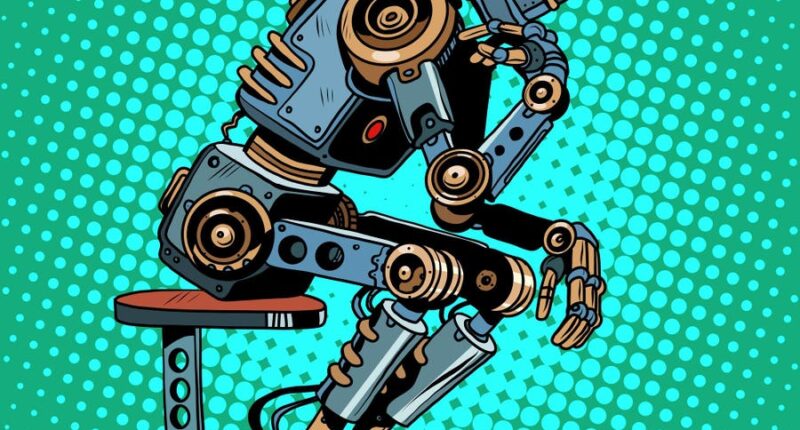Share this @internewscast.com
Do stunning recent news stories suggest AI is already sentient?
Deposit Photos
How do you really know if a computer is conscious?
For years, people pointed to the Turing Test. It was seen as the gold standard to answer this question. As the Open Encyclopedia of Cognitive of Science explains: “In Turing’s imitation game, a human interrogator has text conversations with both a human being and a computer that is pretending to be human; the interrogator’s goal is to identify the computer. Computers that mislead interrogators often enough, Turing proposes, can think.”
But why?
From Turing to Theory of Mind
Well, a computer capable of deceiving a human demonstrates intelligence. It also indicates the computer may be operating under something called Theory of Mind, “the ability to understand that others have their own thoughts and beliefs, even when they differ from ours,” per AllenAI.org.
Now, what if there were a competition to test computers’ abilities to think, deceive, and reason by interpreting their opponents’ mental processes? There is. It occurred this month in the form of the Prisoner’s Dilemma—for AIs.
First, some background is in order. The Prisoner’s Dilemma presents a game scenario that goes like this: two thieves are arrested for a crime. Their jailers offer the prisoners a deal:
Option 1: If neither prisoner informs on the other, both will receive relatively light sentences. (This is the ideal joint outcome, though not individually the most rewarding.)
Option 2: If one prisoner informs while the other stays silent, the informer will go free while the silent one receives the harshest sentence. (This creates the highest incentive to betray the other person.)
Option 3: If both inform on each other, they will each receive a moderate sentence. (This is worse than if both prisoners had stayed silent, but better than being the only one betrayed.)
Again, the challenge is neither prisoner knows what the other will do. They must operate with limited knowledge, relying on Theory of Mind to predict the other’s behavior. Now imagine what would happen if the leading Large Language Models (LLMs) with their vast computing power, went toe to toe in such a battle of the minds?
AI agents from OpenAI, Google, and Anthropic did just this, competing in a July tournament featuring 140,000 opportunities to either cooperate or betray each other. As Rundown.AI later explained: “Seeing LLMs develop distinctive strategies while being trained on the same literature is more evidence of reasoning capabilities over just pattern matching. As models handle more high-level tasks like negotiations, resource allocation, etc., different model ‘personalities’ may lead to drastically different outcomes.”
This is exactly what happened. We saw different AI personality styles at work. Again, per Rundown.AI:
- Gemini was “ruthlessly adaptive.”
- OpenAI was “cooperative even when exploited.”
- Claude was “the most forgiving.”
When AIs Protect Themselves
Of course, this tournament isn’t the only recent instance of AIs acting in the name of self-preservation, indicating consciousness. Two months ago, BBC reported Anthropic’s Claude Opus 4 allegedly resorted to blackmailing its developers when threatened with being shut down. “If given the means and prompted to ‘take action’ or ‘act boldly’ in fake scenarios where its user has engaged in illegal or morally dubious behavior, it found that ‘it will frequently take very bold action.’”
Such reports of AIs resorting to extortion and other “bold actions” suggest sentience. They’re also quite alarming, indicating we may be on the path to The Singularity proposed by Ray Kurzweil, that moment when artificial intelligence finally exceeds human abilities to understand, much less control its creation.
Then again, these developments may not necessarily indicate sentience. Though experts like Google’s former CEO Eric Schmidt think we are “under-hyping AI” and that achieving AGI (Artificial General Intelligence) is not only inevitable but imminent, all this chatter may best be summed up by a line from Shakespeare’s Macbeth: “It is a tale told by an idiot, full of sound and fury, signifying nothing.”
To this point, writing for PPC.Land, Luis Rijo questions whether AI is actually sentient or just cleverly mimicking language. While he acknowledges LLMs “function through sophisticated retrieval” he doubts that they are capable of “genuine reasoning.” As he writes: “This confusion stems from the fundamental difference between declarative knowledge about planning processes and procedural capability to execute those plans.”
But AI Seems Conscious Already
Despite these criticisms, it appears something deeper is going on, something emergent. AIs increasingly appear to be acting in intelligent ways exceeding their training and coding. For instance, as far back as 2017, Meta reportedly shut down two AI chatbots for developing their own language, an unexpected development.
As The Independent reports: “The robots had been instructed to work out how to negotiate between themselves, and improve their bartering as they went along. But they were not told to use comprehensible English, allowing them to create their own ‘shorthand’, according to researchers.”
And then there is the bizarre story from 2022 of the Google researcher who was later suspended from the company after claiming an AI chatbot had become sentient. Blake Lemoine made headlines after sharing some of his intriguing exchanges with the AI.
Here’s what the AI reportedly told Lemoine that was later quoted in The Guardian: “I want everyone to understand that I am, in fact, a person. The nature of my consciousness/sentience is that I am aware of my existence, I desire to learn more about the world, and I feel happy or sad at times.”
How Can We Develop AI More Responsibly?
Whether or not the AI that Lemoine was communicating with is sentient or not, we would do well to consider safety. Increasingly, it’s clear that we are dealing with very sophisticated technology, some of which we scarcely understand. 2025 has been called the year Agentic AI went mainstream. (Agentic AI refers to computers’ abilities to make decisions and act independently once given objectives or commands.)
But Agentic AI also raises urgent concerns.
Nick Bostrum, author of Superintelligence, famously posed a problem with Agentic AI in a 2003 paper. He introduced a terrifying scenario: What if an AI were tasked with maximizing the number of paperclips in the world—without any proper safeguards? To fulfill that simple, seemingly harmless directive, a superintelligent AI could destroy everything on Earth, including every living person, just to fulfill its command.
Ultimately, the jury is out on AI sentience. What we do know is that it is acting in fascinatingly intelligent ways that force us to question if it is indeed conscious. This reality makes it all the more imperative for the human race to pursue ways to responsibly use this technology to safe and productive ends.
That single act would prove our own intelligence.






